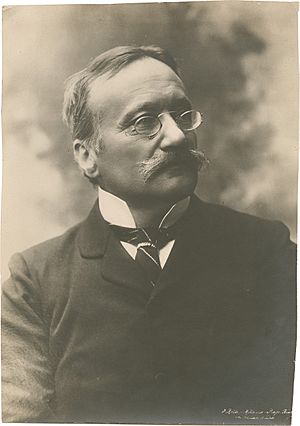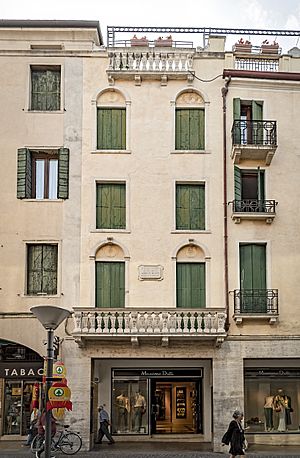Arrigo Boito facts for kids
Arrigo Boito (born Enrico Giuseppe Giovanni Boito on February 24, 1842 – died June 10, 1918) was a talented Italian poet, journalist, writer, and composer. He is most famous for writing the stories (called libretti) for some of the greatest operas. These include Giuseppe Verdi's amazing operas Otello and Falstaff, and Amilcare Ponchielli's La Gioconda. Boito also wrote his own opera, Mefistofele. He was a key figure in an artistic movement called the Scapigliatura, along with his brother Camillo Boito.
Contents
About Arrigo Boito
Arrigo Boito was born in Padua, Italy. His father, Silvestro Boito, was a painter, and his mother, Józefina Radolińska, was a Polish countess. Arrigo studied music at the Milan Conservatory until 1861. His older brother, Camillo Boito, was a well-known architect and writer.
In 1866, Arrigo Boito joined the army and fought alongside Giuseppe Garibaldi in a war where Italy and Prussia fought against Austria. After this war, the city of Venice became part of Italy.
Later in his life, Boito became the director of the Parma Conservatory, a famous music school, in 1889. He held this important job until 1897. He also received an honorary degree from the University of Cambridge in 1893. When he passed away in Milan, he was buried in the Cimitero Monumentale di Milano, a large cemetery.
His Music Career
Arrigo Boito did not write many musical pieces. He completed one opera called Mefistofele, and started another, Nerone, which was finished by other composers after his death.
Mefistofele Opera
Boito's only complete opera, Mefistofele, is based on the famous story of Faust by Goethe. It first opened on March 5, 1868, in Milan. Boito himself conducted the performance. However, the first show was not very popular and caused some arguments. The police even had to close it after only two performances! The famous composer Giuseppe Verdi said about it, "He tries to be original but only manages to be strange."
Boito decided to change and improve the opera. He made it shorter and changed the voice part for the character of Faust. The new version was performed in Bologna in 1875 and was a big success! Today, Mefistofele is the only one of Boito's operas that is still performed regularly. The beginning part of the opera, which takes place in heaven, is often played at concerts.
Writing for Operas (Librettos)
Boito was an excellent writer. Besides writing the stories for his own operas, he also wrote them for other famous composers. He used a secret pen name, "Tobia Gorrio," which was an anagram of his own name. Under this name, he wrote the story for Amilcare Ponchielli's opera La Gioconda.
Working with Verdi
Boito became good friends with the legendary composer Giuseppe Verdi. Their friendship grew stronger when the music publisher Giulio Ricordi encouraged them to work together. Verdi first asked Boito to help him revise the story for his opera Simon Boccanegra. This revision was very successful in 1881.
After this, their friendship and respect for each other grew even more. Boito then wrote the amazing stories for Verdi's last two masterpiece operas: Otello (based on Shakespeare's play Othello) and Falstaff (based on Shakespeare's plays The Merry Wives of Windsor and Henry IV). When Verdi passed away in 1901, Boito was right there by his side.
Operas with Boito's Stories
Here are some of the operas for which Arrigo Boito wrote the stories (libretti). The years listed are when they were first performed. Boito also wrote the words for Verdi's song Inno delle Nazioni in 1862.
- Amleto (for Franco Faccio; 1865)
- Mefistofele (for his own music; 1868 and 1875)
- Un tramonto (for Gaetano Coronaro; 1873)
- La falce (for Alfredo Catalani; 1875)
- La Gioconda (for Amilcare Ponchielli; 1876)
- Ero e Leandro (for Giovanni Bottesini; 1879 – and Luigi Mancinelli; 1897)
- Simon Boccanegra (for Giuseppe Verdi; 1881, a revised version)
- Otello (for Verdi; 1887)
- Falstaff (for Verdi; 1893)
- Nerone (for his own music, unfinished; 1924)
Boito in Media
- A play called After Aida (from 1985) shows how Giulio Ricordi and Franco Faccio worked hard to convince Verdi to team up with young Boito. This teamwork led to the creation of the opera Otello.
- In 2001, a radio play named Tell Giulio the Chocolate is Ready was broadcast. This play was based on the letters exchanged between Verdi and Boito. It explored how their opera Otello came to be.
Images for kids
See also
 In Spanish: Arrigo Boito para niños
In Spanish: Arrigo Boito para niños
 | Janet Taylor Pickett |
 | Synthia Saint James |
 | Howardena Pindell |
 | Faith Ringgold |





